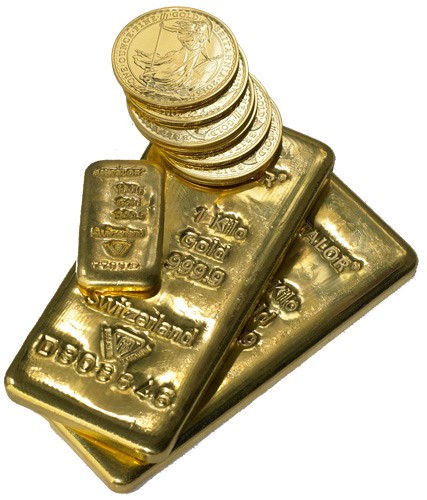Gold Bullion ETF’s V Gold Bullion Storage How Safe Is Your Gold
Post on: 7 Июль, 2015 No Comment

If you’re new here, you may want to subscribe to my RSS feed. Thanks for visiting!
Gold Bullion ETF’s V Gold Bullion Storage: How Safe Is Your Gold?
The gold bullion market became very difficult for investors and traders to access during the years when the gold price slid down to $260 an ounce. The investment market literally dried up as demand dwindled and dealing costs accelerated. The emergence of gold bullion ETF’s and commercial gold bullion storage programs has opened up the range of choices available to both the retail and institutional investor. Some important points for consideration follow.
One of the fundamental constraints that worked against new gold bullion investment buyers was the availability of the gold bullion good delivery bar. Professional buyers don’t accept any other bars as adequate delivery by a seller for a spot market gold trade. These bars are 400 oz each and must be kept continuously in an accredited storage vault to retain their integrity. Due to the fact that gold vault operators operate a cautious business, this acted as a barrier to entry for both the institutional and private buyer. Investors who choose to take delivery of good delivery bars face an immediate loss of integrity once they leave the vaulting circuit. [1] For this reason, it is essential to consider the cost of re-establishing bar purity and the associated delay which acts as a significant selling impediment. Gold bullion ETF’s and gold bullion storage programs offer a convenient alternative to holding physical bullion, each with a slightly different structure and advantages.
Gold bullion ETF’s are gold denominated debt securities that are required by trust deed to back the securities by gold assets. Usually this is in the form of vaulted good delivery bars but may also include other gold assets in a temporary form that will most likely be converted to physical good delivery gold bars in due course. ETF’s generally hold their gold in London in unspecified bullion vaults. A US example of this is the Streettracks Gold Bullion ETF (GLD). The SPDR Gold Trust ETF’s is structured as one-tenth of a troy ounce of gold and held by the custodian (HSBC) in London. The gold weight of each of these units steadily declines over time due to the fact that a daily management charge occurs. Of further significance is the legal ownership of the gold. With a gold bullion ETF the trust owns the gold and you are a beneficiary of the debt owned by the trust and backed by its gold. Your exposure is therefore to the storage location in London and also the state trust deed laws, under whose laws the ETF trust deed was drawn up.
In contrast, the newer online gold bullion storage programs actually revolutionize gold bullion trading and investing. When you initiate a transaction through a gold bullion storage program you actually own the gold and it is protected under the property laws in the jurisdiction in which your gold is held. Your property right is not diminished by the safekeeping of a custodian or trust deed. To provide flexibility and to accommodate changes which may occur in national laws, you have the choice of storing your gold in Switzerland, the UK or the US. This results in your gold being held exclusively under your chosen jurisdiction of choice.
Currency Flexibility
The GLD Gold Bullion ETF trades in US dollars on the US exchange. Gold bullion ETF’s that trade on other worldwide exchanges also trade in their respective currencies. This is convenient for residents transacting in their respective location as they are not confronted with paying currency conversion fees if they deal purely in the accepted currency. For international traders and investors who want to trade GLD it is a different story. Dealing in another currency can add a significant cost to your transaction if you hold your account value in any other denomination. Currency conversion takes place at the firm’s standard rate which is frequently 3% or more in currency transaction spreads. A gold bullion storage program overcomes this problem by trading directly in US dollars, Euros or Pounds. Traders and investors do not encounter currency conversion costs since they deal directly with other traders trading gold in the same currency.
Gold Storage Cost Considerations
ETF’s are slightly cheaper up until $12,000 due to the minimum storage charge levied by gold bullion storage programs. If you are transacting above $40,000 then the storage and insurance can be less than 1/3 of the cost of storage and insurance within an ETF. Furthermore, with some ETF’s, your gold may or may not be insured depending on the ETF provider.
In the GLD SPDR Gold Trust prospectus, the trust can liquidate if there is less than $350 million in the trust, if the NAV (net asset value) drops below $50 million or by an agreement from the shareholders owning at least 66.6% of the outstanding shares. Granted this would be a remote possibility, it is still a risk that remains open and one that online Gold bullion storage purchasers don’t have to contend with.[2]

So Which One Is Better?
Gold bullion storage programs are the clear winner for legal safety due to the fact that your gold is considered your property right from the outset and you are not subject to any liquidation provisions. You also have the added versatility of jurisdictional control. If you are not concerned about risk and primarily concerned about transaction cost then the answer is a little more complex. It can depend on transaction size, currency conversion costs, dealing spreads/commissions and market developments [3]. ETF’s do offer the convenience of being a growing asset class and are now part of many broker platforms. This can provide easy access for residents who do not have to contend with high cost considerations and are transacting in small amounts over a shorter time frame. For some professional funds, the mandate requires that the fund purchase structured securities traded on a formal stock exchange and for this purpose ETF’s fulfill a very useful role.
Learn more about a gold storage program that can allow you to earn the spread and cut your gold dealing costs simply and safely. Sign up above to find out more and to claim your free gram of gold.
[1 ] Gold ETF
[2 ] The Gold Showdown: ETFs Versus Futures
[3 ] BullionVault vs Gold ETFs














